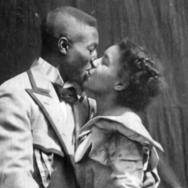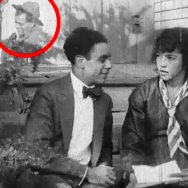For their work, the National Endowment for the Humanities selected Field and Rings as the first Public Scholar recipients at UChicago’s Division of the Humanities to each receive $60,000 grants and Zeitlin and collaborators at the University of Wisconsin, Madison, to obtain a Scholarly Editions and Translations award of $298,954.
“These three humanities scholars are undertaking work that reverberates outside of academic circles and will enrich broader audiences,” said Deborah L. Nelson, dean of the Division of the Humanities and the Helen B. and Frank L. Sulzberger Professor of English Language and Literature and the College at UChicago. “Their scholarship richly deserves this strong acknowledgement from the National Endowment for the Humanities.”
Celebration of Black love
Field’s identification of the short film “Something Good—Negro Kiss” in late 2018 forms the center of her book project, “Black Love on Screen.” The 29-second silent film from 1898 captured the public imagination and went viral on social media channels, igniting passionate responses from director Barry Jenkins, actress Viola Davis and many other Hollywood and Black luminaries.
“Very few films survive from early cinema (the period before 1915). By most estimates 90 percent are believed lost, and the percentage is even higher for films made by Black producers,” said Field, associate professor in the Department of Cinema and Media Studies and the College at UChicago. “History has been written on an absence of a visual past for a body of work that is so vital for shaping the perceptions of race and struggle in our society.”
She is mining the archives to find what has been hidden in plain sight for her book scheduled to be published by the University of California Press and revising the view of early American cinema and the representation of Blackness in popular culture. Her goal is to make the book resonate for artists, filmmakers and the intellectually curious public and to inspire new generations of artists and laypeople.
“Field has found a way to combine basic research—the foundation of humanistic scholarship—with conceptual innovation and public engagement,” said Richard Neer, the William B. Ogden Distinguished Service Professor in the Departments of Art History, Cinema and Media Studies and the College and Director of the Franke Institute at UChicago. “Combine that with her tireless energy, and you get a truly dynamic and pathbreaking scholar who richly deserves this grant—and will use it to produce something magnificent.”
Field views her scholarship on Black love in cinema as rectifying historical erasures and accounting for the afterlives of archival rediscovery. Her first book, “Uplift Cinema” (2015), honed her research skills and showed her how to navigate absences in the historical records. She knows how to find answers to questions that are elusive in the archives.
As the earliest known instance of Black affection on film, “Something Good—Negro Kiss” defies racist images of Blackness, vaudevillian blackface and gags on skin color. Film scholars did not think such films existed.
Exploring the music of Bob Dylan
Some years ago, Rings realized that Bob Dylan’s lyrics had been written about extensively, while his music had been relatively neglected. He wanted to explore Dylan as a musician and the idiosyncratic sounds he makes and analyze the changes to his music throughout his long, storied career.
“Bob Dylan’s musical imperfections intrigue me,” said Rings, associate professor in the Department of Music at UChicago. “It’s easy to tally his sins against ‘good musicianship.’ His voice is famously polarizing. His guitar, piano, and harmonica playing are unkempt. Yet he is one of the most recorded musicians in history, and millions of fans hang on every flubbed note and dropped beat. What gives these wayward sounds such efficacy?”
While Rings did not begin as a Dylan fanatic, he admits to becoming one over the course of his research, intrigued with Dylan’s ever-changing music and his encyclopedic knowledge of styles and genres. Rings wants his forthcoming book “Sounding Bob Dylan: Music in the Imperfect Tense” and its accompanying website, with recordings of Dylan’s music, many of them bootlegs, to provide a more complete portrait of the artist.
Rings has tapped into his own knowledge of musical instruments to understand Dylan’s music. Rings played the guitar professionally until an injury cut short his musical career in the late 1990s. Despite the injury, he resumed playing the guitar during the pandemic. Rings plays the piano as well, using his knowledge of it to better understand Dylan’s flat-fingered technique. As for the harmonica, Rings had never played it before, so he learned to do that, too.
“Steve Rings has long distinguished himself as a scholar whose thinking encompasses a vast range of scholarship in the humanities,” said Philip V. Bohlman, the Ludwig Rosenberger Distinguished Service Professor in the Department of Music and the College at UChicago. “In his teaching and writing, he insistently asks us to connect the aesthetic and affective details of music to the public body of knowledge they elucidate.”
Traditionally, authors have focused on Dylan’s lyrics and his literary storytelling. The musician’s highest accolades such as the Nobel Prize for Literature have touted his profound knowledge and use of literature and literary sources. Rings disputes this primary focus on lyrics, contending that his music is meant to be heard and not analyzed apart from how it sounds. After all his research, he believes Dylan is more of a music fanatic than a literary one.
“In prose that mixes shimmering clarity and profound depth, Steve Rings’s book on Bob Dylan promises to change fundamental aspects of the way America's iconic bard is assessed,” said Larry Zbikowski, the Addie Clark Professor and Chair in the Department of Music at UChicago.
Bringing ghosts to life in Chinese literature
Zeitlin’s fascination with ghosts in Chinese literature began during her graduate studies at Harvard University and has continued throughout her career. The collaborative grant from the NEH allows her to be the sole translator for “Liaozhai’s Strange Tales: A New Complete Annotated Translation” by Pu Songling, which is under contract with the Oxford University Press and encompasses four volumes and close to 500 tales from the 17th century featuring ghosts, spirits and foxes.
The NEH grant, however, only supports the first and “most important volume of the ‘Strange Tales,’” according to Zeitlin, as well as an interactive website to accompany the translation through the cartography laboratory at University of Wisconsin, Madison, which will plot the places in the story, and several workshops to be held in the summer of 2024.
“These literary tales can be read independently, but they also speak to one another,” said Zeitlin, the William R. Kenan Jr. Professor in the Department of East Asian Languages and Civilizations, the Committee on Theater and Performance Studies, and the College at UChicago. “Pu calls himself the historian of the strange, and these tales are related to the world around him. They open out and circle back to him, showing us a normative, fascinating view of 17th-century Chinese society.”
Unlike the fairy tales based on hearsay and oral folkloric traditions written by the Brothers Grimm, Pu’s stories have an authoritative, individualized voice. Also, ghosts in Chinese literature have a richer tradition than the European ones. Ghosts are sexual in these tales, whereas Zeitlin contends Western culture’s ghosts are largely undifferentiated. In some of these tales, mortal men have sex with female ghosts and bring them back to life. Culturally, these ghosts reflect Chinese society’s ideas of immortality, authorship and memory.
“Judith has such an intimate knowledge of Pu Songling's work, and her translations are so elegant and precise—just delightful. They bring to life a whole world of spirits and revenants, of fantastic encounters and bizarre events that are as imaginative as they are deeply resonant with their own time and place,” said Paola Iovene, associate professor and director of the graduate program in the Department of East Asian Languages and Civilizations and the College at UChicago. “Pu Songling's ‘Strange Tales’ will be the crowning achievement of her career.”
For Zeitlin, not every “Liaozhai” tale is a miniature masterpiece, but she finds a remarkable number of them are. One tale called “Gong the Daoist Immortal” can be interpreted as an allegory for Pu Songling’s art. Through the figurative expression “a world in a sleeve,” which means a macrocosm in a microcosm, he uses the inside of the Daoist’s sleeve to become a magical refuge for two cruelly separated lovers—a scholar and a prince’s household entertainer—to consummate their forbidden passion. Later the sleeve transforms into the delivery room for the pregnant entertainer to have her baby.
To provide the best translation, Zeitlin moves in and out of these tales to recover the larger literary culture that the story came from and then returns to the stories. This allows her to use the literary world to illuminate the tale and the story to illuminate that world.

